The Daily Grind
Somehow – I am not sure how – Shots has survived the last few weeks whilst its spiritual leader and earthly benefactor, millionaire playboy Prince Ali Karim, has been rubbing shoulders and exchanging bar tabs with the great and good across the Atlantic at this year’s Bouchercon convention held in one my favourite of those United States, North Carolina.
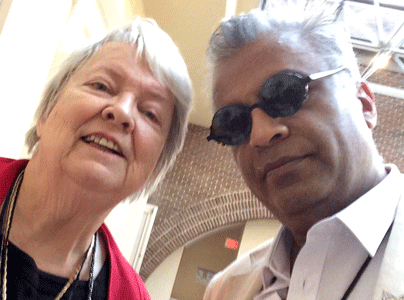
Only increasing infirmity and a minor misunderstanding with Homeland Security prevented me from attending and joining Prince Ali in congratulating my old chumette Margaret Maron on her Lifetime Achievement Award. It was fitting that the first Bouchercon to be held in North Carolina should honour Margaret, who lives and sets many of her books there. If she were British, she would be classed as a National Treasure, but I am unsure whether our former colonies have an equivalent term of endearment.
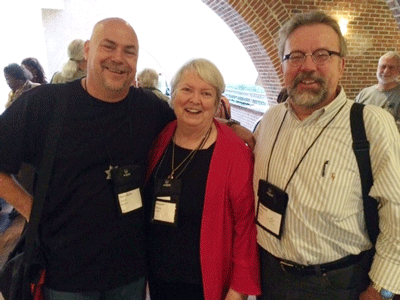
Prince Ali did make himself useful in one respect, by snapping away with one of the many spy cameras concealed about his person and sending me this picture of Margaret Maron accompanied by her two bodyguards, Kevin Burton Smith (of The Thrilling Detective) and Jeff Kingston Pierce (The Rap Sheet). He also managed to bring back safely a copy of Margaret’s latest novel Designated Daughters which she had kindly signed for me.
In his absence, of course, the dedicated staffers here at Shots have had to work overtime, attending party after party with barely a respite. Of course it was a burden we shouldered with a singing heart when the occasion was to mark the publication Martina Cole’s latest best-seller Get Even from Headline.
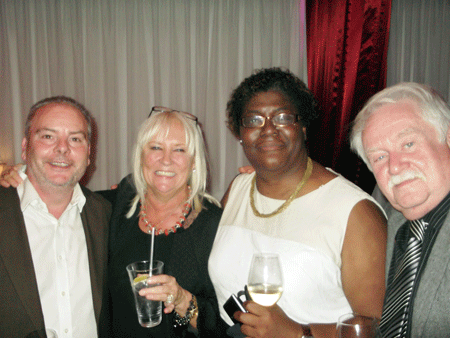
The party was held in a venue totally new to me, a select Mayfair establishment which not only offered the finest wines (and canapés) known to humanity, but also provided, for the elderly and infirm such as myself, fully-trained healthcare assistants who were always on hand to help the revellers when things got a little too much for them.

To promote their impressive crime fiction list, publisher Harvill Secker chose to put on a ‘Showcase’ presentation in The Queen of Hoxton, one of Hackney’s most fashionable venues which I am told is extremely popular with the younger generations who, if the lighting level was anything to go by, must have excellent night vision. Fittingly, many of Harvill’s younger authors were on show and were interviewed by that Young Turk of crime critics, Jake Kerridge of the once-great Daily Telegraph.
 
The ‘Showcase’ took the form of a series on 10-minute on stage interviews – an interesting and effective way of introducing new authors – among them rising star Eva Dolan, whose third novel After You Die is published in January, and ‘rising man’ (pun entirely intended) Abir Mukherjee, whose first novel, set in Calcutta in 1919, A Rising Man is due in May 2016.
 
To add gravitas to the proceedings, it was of course necessary to employ Professor Barry Forshaw, not only because of his fluency in Old Norse – necessary for dealing with the compulsory Scandinavian element in every publisher’s portfolio – but also to interview Northern Ireland’s Stuart Neville, whose latest novel Those We Left Behind came out in June.
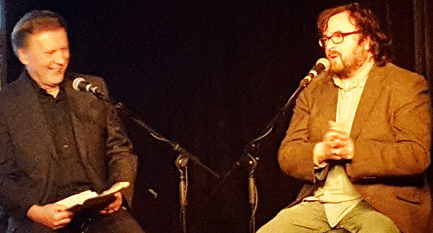
Despite jet lag having recently returned from Bouchercon, Stuart Neville is now an old hand at dealing with interviews and seemed more at ease with the format than Professor Forshaw who clearly did not relish short-changing the audience by having to squeeze his usual hour-long interrogation into a mere ten minutes.
After such an exhausting schedule, basking in the enthusiasm and energy of all these young crime writers, it was a blessed relief to relax over a civilised luncheon with my old and distinguished friend, the doyen of crime fiction reviewers, Marcel Berlins.
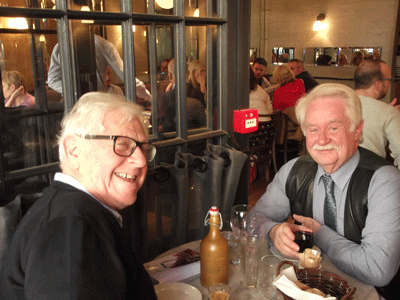
Naturally, under the Ancient Code of Crime Reviewers (they’re more guidelines really) I cannot reveal which sensitive matters were discussed or whether or not the future of crime fiction as we know it was at stake.
What’s Hot
Former CIA officer Charles McCarry, who is I believe in his 85th year, has produced another finely-crafted and delicately poignant tale of modern espionage in The Mulberry Bush, which is published this month by Head of Zeus. In the often frenetic, shoot-first-explain-later world of contemporary spy fiction, it is always a pleasure to revel in Charles McCarry’s skill at plotting and executing a piece of fine writing where every character is patiently and sympathetically unmasked.
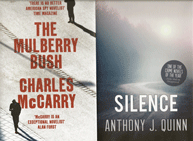
Also from Head of Zeus this month, an author new to me but coming with a warm welcome from that noirista Irish poet Ken Bruen, whose recommendations I always note and sometimes follow, especially when he describes a book thus: “As beautifully written as the wild ferocity of Lough Neagh”. (I have seen Lough Neagh; it is indeed wild and the hospitality of the pubs around it is indeed ferocious.) So I am keen to try Silence by Anthony J. Quinn, who hails from County Tyrone and whose detective hero is the wonderfully-named Inspector Celcius Daly.
Those inventive marketing people at Penguin (or ‘The Random Penguin’ as it now seems to be known) have done a splendid job in packaging review copies of their “paperback original” The Sea Detective by Mark Douglas-Home. The book features Edinburgh-based oceanographer and environmentalist Cal McGill (the sea detective of the title) and review copies came with a map of the Western Isles and a visiting card from ‘Flotsam & Jetsam Investigations’, all caught up in a piece of authentic-looking fishing net.
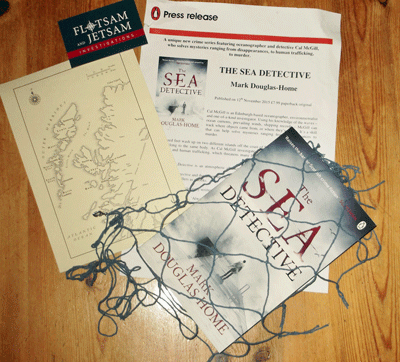
Suitably impressed with the presentation and always willing to release my inner-Hammond Innes on a good sea-going adventure, I am, however, rather puzzled how a “paperback original” not published until the 12th November can have already garnered such glowing reviews from newspapers in Scotland (where the author, co-incidentally, was a prominent journalist) as well as The Times Literary Supplement and The Literary Review, where my old and distinguished friend Jessica Mann chose it as one of the top five crime novels of the year. Not only that, but the book has attracted a fistful of favourable reviews on Amazon, some dating as far back as 2011.
After some detailed detective work, which involved reading the accompanying press release to the bottom of the page, I discovered that The Sea Detective first appeared some time ago as a Kindle eBook. One might quibble, therefore, at the description of it as a “paperback original” but even I have to admit that the alternative, “first time as a proper book”, just doesn’t have the same sexy marketing ring to it.
As the long winter nights draw in, the below-stairs staff here at Ripster Hall have gathered around the flickering valves of the television set I provided so they could watch the Coronation ceremony, enjoying a new BBC crime series called River. I have to admit to some confusion on first viewing, partly because the main female character, a police detective, is played by Nicola Walker, who also plays a police detective in ITV’s rival series Unforgotten, but also because no one in London’s Metropolitan Police seems to realise that the titular Inspector John River is Swedish. (Played, it has to be said, with grumpy brilliance and Scandinavian gloom by Stellan Skarsgärd.)
The key thing about Inspector River is that he sees dead people – notably the ghost of his murdered former partner played by Nicola Walker, who is still feisty even though dead. Now this scenario might sound familiar, and not just to fans of Charlie Higson’s revival, some years ago now, of the quirky TV series Randall and Hopkirk (Deceased). Much more recently, Italian crime writer Maurizio De Giovanni claimed top spot when it comes to detectives seeing ghosts with his compelling, almost hypnotic, Commissario Ricciardi novels set in Naples in the early 1930s.

The Bottom of Your Heart, sub-titled Inferno for Commissario Ricciardi, is the seventh in De Maurizio’s richly-woven series from Europa Editions featuring the sympathetic and haunted (literally) Ricciardi and his wonderfully earthy sidekick Brigadier Maione, struggling to do their jobs – and more importantly do right – in the ants’ nest of Naples whilst coping with crime, ghostly manifestations and Mussolini’s Fascist state. It all makes for a rich, spicy and very nourishing stew, perfect nourishment for the mind and the soul of any warm-blooded reader; finely written and immaculately translated.

After the success of Gone Girl, Gillian Flynn is at that stage of her career when even her notes to the milkman would probably find a publisher. For all those readers suffering withdrawal symptoms waiting for her next novel, Weidenfeld & Nicolson have published her Edgar Award-winning short story The Grown Up as an 80-page paperback which will make an excellent (if slightly uncomfortable) stocking-filler this Christmas and might just stave off the pangs until the film version of her second, excellent, novel Dark Places (which reminded me of Ruth Rendell in her pomp) is released next year.
Michael Kurland is an American crime writer possibly best known for his Professor Moriarty novels, but at last the first of his much-praised Alexander Brass mysteries, from 1997, is published here by the enterprising Titan Books.

Too Soon Dead, described in the US as “a fabulous whodunit” is set in New York in 1935 and introduces newspaper columnist extraordinaire Alexander Brass, who wisely advises the narrator of the story not to take a job in journalism as “It can’t do you any good as a writer”. Wise words indeed.
With Christmas just around the corner, the logic of republishing Murder For Christmas for the first time since 1949 (?) is fairly obvious.
 
Little is known, at least by me, about the author Francis Duncan except that he wrote more than 20 crime novels between 1937 and 1959 and so can probably claim ‘Golden Age’ status. He is not, I am assured, to be confused with Willian Murdoch Duncan (1909-76), who wrote over 200 crime novels and thrillers between 1944 and his death.
If seasonal Golden Age murder mysteries by little-known authors are your thing, then the new edition of Murder For Christmas, published by Vintage at £8.99, is excellent value compared to taking a chance on a first edition hardback, if you can find one, at the going-price of around £110.
|
|
What’s Going To Be Hot
I already have a groaning tower, teetering Pisa-like, of proofs of books all hoping to be the next big thing in 2016 but the most mouth-watering clash of forthcoming titles will surely be that involving two “big beasts” of the BBC who have turned their hand to writing thrillers.
In March, Radio 4’s James Naughtie, a vocal enthusiast of all crime writers with a Scottish heritage, has a second novel out from Head of Zeus: Paris Spring. I somehow missed his debut last year, despite requesting a review copy. But then, you see, I’m English, so I have already staked a claim to Crisis, coming from Transworld in June, which is a debut thriller by Frank Gardner, the BBC’s Security Correspondent.

First out of the traps in the New Year though, in early January, is the debut crime novel by a very experienced writer for television, Phil Redmond, the creator of long-running dramas such as Grange Hill, Brookside and Hollyoaks. Published by Century, Highbridge is both the title and the setting – ‘a typical Northern town’ according to Redmond. Judging by the opening of Chapter 1 – The trouble with living in a mediocre town is that you end up having to support a mediocre football team – it could be based on several real ones.

With a new publisher (Head of Zeus) in February, Colin Bateman’s new novel Paper Cuts sees him back on familiar darkly comic territory, that heady mix of dubious journalist heroes and the casual, almost cavalier attitude to violence which has become his trade mark. He introduces a new central character in Rob Cullen, a Guardian journalist transported from London to Northern Ireland (quite why I do not know yet – presumably for some terrible misdemeanour) to breathe life into the failing weekly paper, the Bangor Express.
For reasons I do not fully understand, but probably have something to do with my lowered security clearance (or the fact that they were first published in America), I have completely missed out of the award-winning ‘Slough House’ series of spy novels by Mick Herron.

However, I will have no excuse in 2016 as the jolly magnificent John Murray are publishing the much-praised first two volumes, Slow Horses and Dead Lions plus the new, third instalment: Real Tigers.
For reasons of vast age and rapidly failing eyesight, I find it difficult to keep up with the prolific Sophie Hannah who seems to be publishing a new novel every six months. However, I will gird my loins to read The Narrow Bed coming in February from Hodder as it features my favourite of Sophie’s recurring characters, police detective Charlie Zailer.

Triple Whammy
Immaculately timed to coincide with the most excellent new Bond film (which I saw on opening night in very distinguished company), Vintage has published The Spectre Trilogy, comprising the three Ian Fleming thrillers which feature that Special Executive for … etc.: Thunderball, On Her Majesty’s Secret Service and You Only Live Twice.

Whilst one cannot quibble about the value of this three-book volume (£12.99) and the interesting and erudite Introduction provided by the Bond film producers Michael G. Wilson and Barbara Broccoli, I will stick to my much-thumbed Pan paperback copies with their iconic covers.
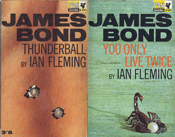
I should also note the companion reissue by Vintage of the first James Bond ‘continuation’ novel from 1968, Colonel Sun, originally published under the pseudonym ‘Robert Markham’ but now proudly under the author’s real name: Kingsley Amis.
There have been several decent biographies of Ian Fleming and a whole library of books about the James Bond industry but now Fleming’s nephew Fergus has edited the author’s letters, as they related to the Bond books, in The Man With the Golden Typewriter from Bloomsbury.

Fergus Fleming has done an excellent job and even though much of the material was covered in Andrew Lycett’s 1995 biography, it is still a treat to read Fleming’s letters as they flew from his gold-plated typewriter to fans, friends, publishers and fellow writers. There is humour in them – something he thought had no place in a thriller – and it is, with hindsight, incredible to read of his early rows with publishers about print-runs (always too small) and dust jacket designs. He was opinionated and could be rude – as he was to Alan Whicker, who wanted to do a Whicker’s World on him, and as he was, in private, about Len Deighton’s Funeral In Berlin.
There are plenty of big names scattered across this correspondence: Noel Coward, E.L. Doctorow (his American editor at one point), designers Ray Hawkey and Dickie Chopping and, famously, Raymond Chandler to whom he wrote in 1956: If one has a grain of intelligence it is difficult to go on being serious about a character like James Bond. You after all write ‘novels of suspense’ – if not sociological studies – whereas my books are straight pillow fantasies of the bang-bang, kiss-kiss variety.
In his Introduction, Fergus Fleming reveals one of his uncle’s most fascinating letters, which had nothing to do with James Bond, but rather concerned a certain Adolf Hitler. In September 1938, he wrote to The Times warning of Hitler’s intentions as detailed in a National Socialist Party Programme circulated in 1920 – four years before Mein Kampf was published. Fleming had acquired a rare copy of the ‘programme’ and pointed out that of the 25 ‘goals’ set out eighteen years before, 22 had already been achieved by the Nazis. Fleming’s implication that the remaining three (the creation of a Greater Germany, repeal of the Treaty of Versailles and the quest for lebensraum) would affect the future of Europe, was indeed a timely warning, though as he pointed out: being forewarned is not necessarily the same as being fore-armed.
Vintage Corner
Said to be one of the earliest and possibly most authentic examples of the ‘police procedural’, with the added kudos of being written by a former Superintendent of the Metropolitan Police’s CID, The Grell Mystery is now back in print more than a century after first publication in 1913.

This is the latest in an impressive list of resurrections from Collins’ Detective Club, the predecessor of the more famous Crime Club; all are immaculately produced and very attractively priced hardbacks (£9.95).
The author (though he did have help from a friendly journalist) of The Grell Mystery – and two subsequent crime novels – was Frank Froëst (1958-1930), who joined the Metropolitan Police as a constable in 1879 (the year of the battle of Rorke’s Drift), became a detective and rose to the rank of Superintendent before retiring in 1912 (the year the Titanic sank).
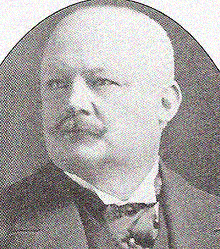
He was, by all accounts, quite an incredible chap, having been involved as a detective in following and arresting in Argentina an absconding fraudster (and MP!) and in the chase to catch Dr Crippen. He could also bend coins and tear a pack of cards in half with his fingers. One suspects the London underworld of the time had a tasty nickname for him.
Whilst I’m in Vintage Corner, I will take the opportunity (every opportunity) to bemoan the fact that the novels of Francis Clifford (1917-1975) are not better known, if indeed they are remembered at all.
 
A genuine – and modest – war hero, Arthur Bell Thompson, then a 22-year-old army Captain, lead a company of native (Karen) troops on an almost 1,000 mile trek through Japanese-occupied Burma in 1942. In 1944 he wrote an account of that dramatic escape under the title Desperate Journey but made sure it would not be published until after his death. (It was, in 1979.) In the 1950s, he began to write fiction under the name Francis Clifford and rapidly established himself as a master of intelligent suspense thrillers, often in exotic settings (South America, Franco’s Spain) with believable, vulnerable central characters.
Several of his novels were filmed, notably The Naked Runner (1966) starring Frank Sinatra and Act of Mercy (1959) with David Niven; and two were awarded Silver Daggers by the Crime Writers’ Association. One of his last books, The Grosvenor Square Goodbye, where a lone sniper starts a day-long siege in full view of the American Embassy, caused quite a sensation when published (and was serialised in a Sunday newspaper) in 1974, and still serves today as a text book on how to inject suspense and pace into a thriller without straining the bounds of credibility.
And before I dismount from my high horse, another author I would like to see back in print (or at least less forgotten) is Christopher Landon, whose best known novel was the famously-filmed Ice Cold in Alex – sometimes referred to as the greatest lager commercial ever made. But apart from that classic wartime thriller, Landon (1911-1961) also wrote excellent spy thrillers and crime novels, notably Dead Men Rise Up Never, which I believe was published posthumously in 1963.
.gif) .gif)
Even though Ice Cold in Alex was still in print as recently as 2004, I have been unable to elicit any information from his publisher (now part of Orion) about the author’s literary estate or the possibility of reissuing titles from his backlist.
New Feature
I am seriously thinking of instigating a new regular feature into this column along the lines of “Encounters or Near-Misses with Crime Writers.”
My inspiration comes from Jeremy Cameron, a crime writer who once chronicled the mean streets of wild Walthamstow but who has sensibly moved to East Anglia. Jeremy tells me that whilst working in The Blue Posts pub near the London Ritz in the later 1960s, one of the waitresses said to him one day: "One of our customers has just told me we have got Graham Greene eating here today." “That’s nice,” said Jeremy and then the waitress said: "By the way, who is Graham Greene?" It transpired that he had been eating there for years, valuing the anonymity and always booking in as simply ‘Mr Green’. Jeremy never actually met him, but as one of his jobs was to fetch wine up from the cellar, he can almost certainly claim that he was once Graham Greene’s wine waiter.
My own near-miss with the great and good, or at least famous, of the crime fiction world came in 1988. My first novel had just appeared and I was being wined and dined by numerous agents offering to represent me. One agent, a delightful lady well-respected in the business, offered to take me to (if memory serves) the Montcalm Hotel near Marble Arch, which did indeed provide an excellent lunch although rather disconcertingly, the hotel dining room was completely empty apart from the two of us.
That was until about halfway through our entrée, when a lone resident entered and took a table at the far end of the restaurant. “That’s Freddie Forsyth,” said the agent, “I must go and say hello”. I was not introduced but I could at least boast that I had lunch in the same room (if not actually “with”) the author of The Day of the Jackal. I somehow doubt that the incident features in his recent memoir The Outsider, though I cannot be sure as the review copy I was promised by publisher Bantam seems to have been mislaid in the post.
Finis
I am, of course, appalled at the proposal that the House of Commons should abandon the tradition of recording all Acts of Parliament on sheets of vellum (a medium I am using more and more now that typewriter ribbons are so difficult to come by) in order to save a few groats from the public purse. I will naturally be writing to all my fellow members of the Parliamentary Beer Club to register my protest, just as soon as I have sharpened a new quill.
I am, however, somewhat mollified by the fact that The Times has revived its practice of setting a Latin crossword for the first time since 1930. (It has been rather a long wait for the solution to that one.)
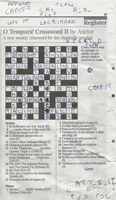
I am rather proud of how far I got with one recently, without resorting to asking my old contubernalis Colin Dexter for help – as I usually have to with English ones. The eagle-eyed may spot, however, that it was my lack of knowledge of Virgil which prevented me from completing the puzzle.
Valete!
The Ripster.
|